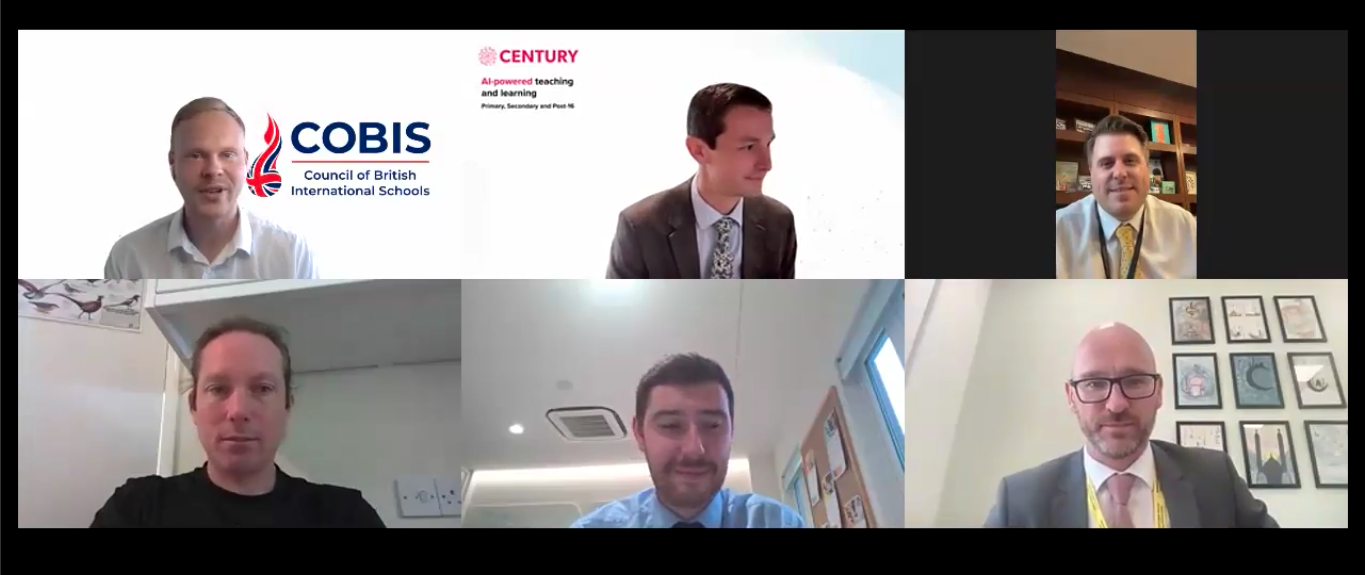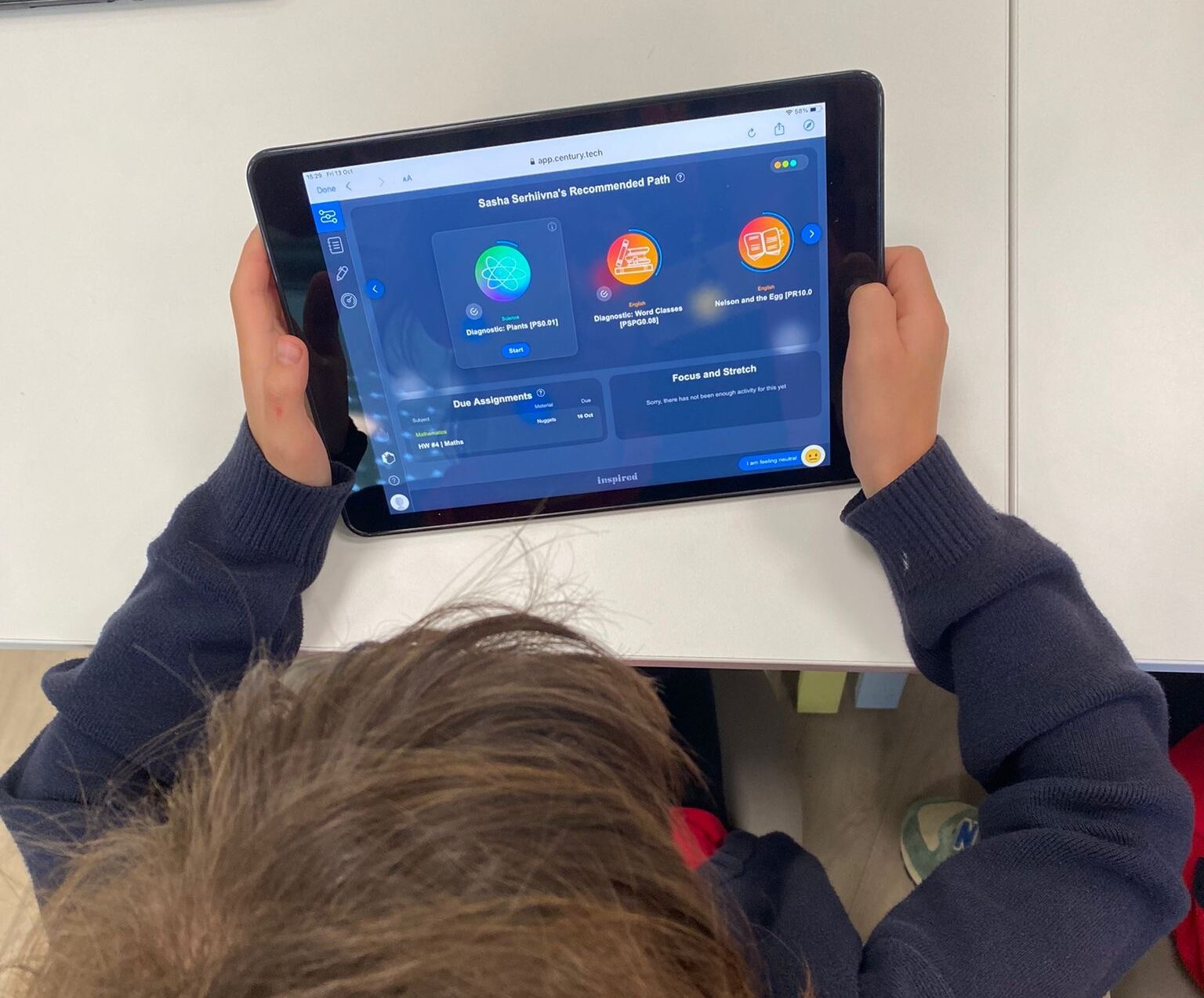CENTURY participates in COBIS wellbeing webinar
Estimated reading time: 4 minutes

Matthew Coleman, Head of Primary and Deputy Safeguarding Lead at Wellington College, Hangzhou
Nick Hart, Principal at Horizon School Dubai
Ian Morris, Head of Wellbeing and Head of ITT at Wellington College, UK
Keith Maguire, Assistant Head (Pastoral) at Wellington College International Shanghai
The session featured a range of speakers across different settings, with the aim of sharing good practice and exchanging ideas. Matthew had kindly provided a list of suggested topics to be covered during the course of the webinar, which guided the conversation.
The discussion started on the careful balance between wellbeing and academic success, with Ian stating that tension between these two things emerges when there is a lack of understanding about the meaning of the term ‘ wellbeing’. Educational institutions need to be very clear on this as it is a much richer concept than feeling good, more akin to a sense of humans achieving their full potential.
Nick described his vision of wellbeing in his school as a school that’s flourishing. Unless children are happy and fulfilled, then they are not going to learn as well as they possibly can. Academics and wellbeing need to be worked on concurrently through a combination of high quality teaching and knowledge of wellbeing. Nick recommended the PERMA framework as a way of helping to embed wellbeing in an organisation.
How wellbeing is tracked in schools was picked up by Keith. He added how pupil progress checkins are often led by data, but quickly and naturally go onto the topic of wellbeing. Tracking pupil progress led to a conversation about the role of technology and how it is there to enhance and not replace what happens in school. This sentiment of making sure we don’t replace the fundamentals of human interaction with technology was echoed by Ian and there was agreement across the panel that, at a primary level in particular, face-to-face check-ins with younger students must still happen.
Technology is a helpful tool for teachers to support students if, as Keith mentioned, it can be used to help students to understand what they’re feeling and why. It can also support those who might slip otherwise through the net, giving them a more private way of communicating. A wellbeing checkin linked to a school’s behaviour platform can flag when a student is feeling down. Teachers can therefore intervene earlier, which minimises the likelihood of something happening later on. Max acknowledged that CENTURY can be part of an effective use of technology in school as it personalises the work students are completing, making sure they are doing the right work for them at the right time. It also contributes to a judicious use of technology as it can be used little and often, for 5 to 15 minutes at a time, minimising screen time.
The importance of definitions returned to the fore when discussing the term ‘mental health’ when we often mean ‘mental illness’. It was noted that there is increased awareness within communities, but that it still carries a stigma for many. The panel agreed on the need to show pupils that it’s OK to not know everything about mental health, as well as the need to normalise conversations about mental health by being vulnerable first. Nick mentioned how his school is taking a proactive, rather than reactive approach, including curriculum adaptation, with members of staff talking about how food, sleep and activity affect feelings, alongside teaching a model for how to discuss emotions. This led to Keith discussing the increase in counselling for primary age children and how emotional support can still be a touchy subject in everyday life. At his school, counsellors now join meetings with staff equipped with information sheets about what counselling involves, to show what this support looks like.
Talking about each school’s context led the panel to discuss where the boundaries of a school end and what educators can do to encourage solid relationships with caregivers and their understanding of their role in their child’s development. Some of the schools hold stay and play sessions to give parents and caregivers the opportunity to see good practice while Keith’s school is considering making an initial meeting with parents obligatory, so that staff know they’ve communicated the message of what is valued by the school.
A school’s values are influenced by a number of factors including inspections. Nick discussed how inspections in Dubai now include a grading for wellbeing. Talk also turned to how, If there isn’t a prescribed curriculum, schools can build things they value into policy. He suggested some high impact wellbeing strategies in Victoria State in Australia for inspiration.
Key takeaways from the session:
- A need to be clear on the definitions of wellbeing and mental health, so these can be embedded into your policies and curriculum and their value can be clearly communicated to all stakeholders.
- A judicious use of technology to help schools to identify where pupils might need support their wellbeing, whether learning more about self regulation or facilitating more in depth conversations with staff.
- Technology should never replace the key face-to-face interactions with pupils.
Matthew shared some different resources that can support in the development of a PSHE curriculum: Positive Education Enhanced Curriculum, Jigsaw Curriculum
To learn more about how CENTURY can support academics and wellbeing within your school, click here to book a demo.
CENTURY in the news
View all News
-
Blog
1st July 2025
The Power of Personalised Learning: Tailoring Homework for Every Student
In this post, our in-house neuroscientist, Alice Little, delves into a phenomenon every teacher witnesses daily - the extend to which student understanding can vary. She explores the cognitive science behind why a 'one-size-fits-all' approach to teaching and learning doesn't work,…
Read more
-
Case studies
30th June 2025
Inspired Italy share why they think CENTURY is the perfect tool…
CENTURY’s Jordan Scearce and Charles Wood spoke to a numbers of senior leaders from Inspired schools in Italy about how the AI-powered platform can complement the IB.
Read more

